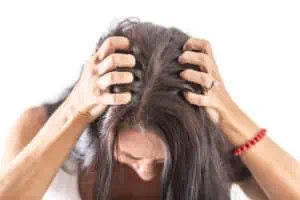
Medically reviewed by: Ted Schiff, MD
The scalp is one of those parts of the body you don’t usually think about — unless it constantly itches. If it does, you know the particular torture itching can cause. Because there are so many possible causes of itchy scalp, you may need the help of a dermatologist to solve the mystery of “Why is my scalp so itchy?” Plus, itchy scalp treatment may include medications that are available only by prescription.
Below are eight conditions that could have you scratching your head.
1. Dandruff or seborrheic dermatitis
The most common reason for an itchy scalp is dandruff, which causes annoying flakes of dead skin that fall from the scalp. Dandruff affects only the scalp, and the flakes are usually small and white or yellowish-white.
A more severe form of dandruff, seborrheic dermatitis, can affect other parts of the body in addition to the scalp, such as the face and upper chest. Unlike dandruff, seborrheic dermatitis also causes scaling and inflammation, and the flakes are greasy and typically more yellow than white.
Dandruff and seborrheic dermatitis can be caused by oily and irritated skin, dry skin or a type of fungus called malasezzia.
What to do: In most cases, you can treat dandruff with a dandruff shampoo. See your dermatologist if it doesn’t help or if you have symptoms of seborrheic dermatitis.
2. Head lice
Head lice are parasites that live on the scalp and sometimes the eyebrows and eyelashes. Children are usually the ones to get head lice, but the critters can spread to people of any age. In addition to itching, you may experience a tickling feeling caused by crawling of the lice. Scratching may cause sores on your head.
What to do: You may be able to get rid of lice at home using an over-the-counter permethrin lotion (Nix), but it’s smart to confirm the diagnosis with a dermatologist first. If symptoms persist, the dermatologist may recommend a prescription treatment.
3. Scabies
Scabies occurs when the top layer of skin is infested with mites (Sarcoptes scabiei) that lay their eggs there. The itching can be intense, especially at night, and you’ll see a pimple-like rash. Scabies can affect the scalp, but in adults, it usually affects other areas instead. Scabies in babies and very young children may affect much of the body, including the scalp.
Anyone can get scabies, but it’s more common in places such as nursing homes and childcare facilities, where people share close quarters and tend to have body and skin contact.
What to do: See a doctor or dermatologist. Scabies can be treated only with prescription medications called scabicides.
4. Psoriasis
This autoimmune disease causes the body to produce skin cells too rapidly. The cells accumulate and form patches or spots. The most common type of psoriasis, plaque psoriasis, causes itching, scaliness and patches of thick, red skin (plaques), often on the elbows, knees and the lower back.
Scalp psoriasis can cause a dry, itchy, flaky scalp, silvery-white scales and red, bumpy patches. The symptoms may extend to the forehead, back of the neck and behind the ears. Unlike seborrheic dermatitis, which can crop up throughout the scalp, scalp psoriasis tends to have a very clear beginning and end.
What to do: See a dermatologist. If the doctor suspects psoriasis, they may refer you to a rheumatologist for treatment.
5. Ringworm (tinea capitis)
When ringworm affects the scalp, it’s called tinea capitis. Despite its name, ringworm is caused by a fungal infection, not worms. The rash appears as ring-shaped patches, which may be pink or red in people with light skin and brown or gray in those with dark skin. The patches are flat with a raised, scaly border, and they can be extremely itchy.
Ringworm is more common in children, but adults can get it, too, particularly postmenopausal women and people who have a compromised immune system.
What to do: Visit your dermatologist. Using an anti-fungal shampoo can be helpful in treating ringworm, but you’ll also need to take prescription anti-fungal medication to get of it.
6. Contact dermatitis or atopic dermatitis (eczema)
An itchy rash on your scalp may be a sign of contact dermatitis, which is triggered by contact with something that irritates your skin or something you’re allergic to. An ingredient in your shampoo, conditioner, hair dye (particularly black hair dye) or another product that touches your scalp is usually the culprit. In addition to being itchy, contact dermatitis can cause redness, inflammation and sores.
Another form of dermatitis, atopic dermatitis, also known as eczema, can affect the scalp and cause itching. It usually develops in people with a personal or family history of asthma or hay fever. Other symptoms you may notice include dry, cracked and discolored skin. Atopic dermatitis is a chronic condition that comes and goes throughout your life.
What to do: For contact dermatitis, avoid the products that cause your symptoms. If you’re having trouble identifying them, see your dermatologist for help. If you think you may have atopic dermatitis, visit a dermatologist, who will develop an individualized treatment plan for you.
7. Scarring alopecia
Some cases of scarring alopecia, also called cicatricial alopecia, can make the scalp itch. In this condition, inflammation damages the hair follicles, causing scarring and patchy hair loss. The cause of the inflammation often isn’t clear, though in some people, a serious infection or a trauma such as a burn may be responsible.
What to do: See a dermatologist ASAP. While the hair loss is permanent, early treatment can prevent further hair loss and scarring.
8. Skin cancer
Itching on the scalp that coincides with a new growth or other skin change on the scalp can be a sign of skin cancer. Basal cell carcinoma, squamous cell carcinoma and melanoma can all appear on the scalp.
What to do: If you notice any skin change on your scalp, such as a flesh-colored waxy bump, a firm red bump, a flat lesion, a scaly patch, a large brown spot, a recurring sore or a mole that follows the ABCDE rules, get it checked by your dermatologist right away.
Written by: Jessica Brown, a health and science writer/editor based in Nanuet, New York. She has written for Prevention magazine, jnj.com, BCRF.org, and many other outlets.





